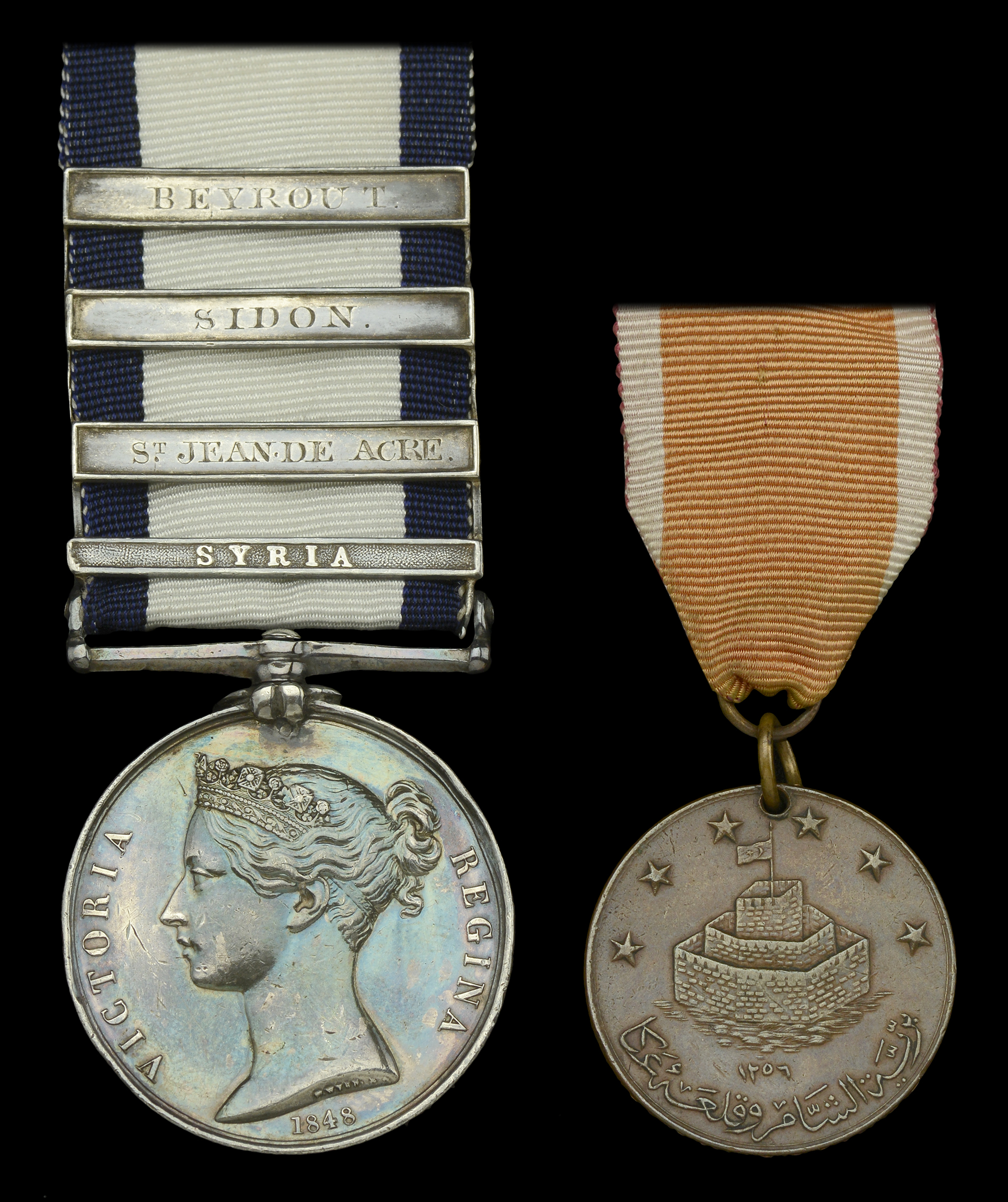169
Pair: Stoker Benjamin Proctor, Royal Navy Naval General Service 1793-1840, 1 clasp,...
Bids do not include VAT, buyer’s premium or delivery.
By confirming your bid, you agree that you have read and accepted the-saleroom.com and the auctioneer's terms and conditions. Confirming your bid is a legally binding obligation to purchase and pay for the lot should your bid be successful.
Choose one of the quick bid options below:
Bids do not include VAT, buyer’s premium or delivery.
By confirming your bid, you agree that you have read and accepted the-saleroom.com and the auctioneer's terms and conditions. Confirming your bid is a legally binding obligation to purchase and pay for the lot should your bid be successful.
Naval General Service 1793-1840, 1 clasp, Syria (Benjamin Proctor.) medal additionally fitted with three contemporary but unofficial clasps mounted on solid silver back-plate, inscribed ‘St. Jean de. Acre’, ‘Sidon’ and ‘Beyrout’; St. Jean d’Acre 1840, bronze (Benjn Proctor) privately engraved in sloping capitals, suspension re-affixed, edge bruising and contact marks, otherwise nearly very fine (2) £800-£1,000
---
Benjamin Proctor is confirmed on the roll as a Stoker on board H.M.S. Gorgon for the Syria operations.
Proctor volunteered at Plymouth and joined Gorgon as a stoker on 13 August 1839, aged 27. Gorgon was the largest steam vessel in the service of the Royal Navy, with accommodation for one thousand troops on board. She is known for her prominent position in the Syrian campaign, during which she transferred troops to the region and was involved in repeated bombardments of Beyrout. The most notable engagement of the conflict was when she participated in the bombardment of Acre alongside paddle sloops Vesuvius, Stromboli, and Phoenix, all under the command of Admiral Robert Stopford. It was either Gorgon or her sister ship H.M.S. Benbow that fired the consequential shell which destroyed Acre's powder magazine and greatly weakened the city's defences - significantly aiding a British victory. Admiral Stopford commented, 'The steam vessels have been eminently useful in constantly moving along a great extent of coast with troops and arms, and taking part in the attacks upon the different forts, which services have been executed entirely to my satisfaction.’
After the close of the conflict, Gorgon returned to England where Proctor was paid off at Woolwich on 2 April 1842.
Naval General Service 1793-1840, 1 clasp, Syria (Benjamin Proctor.) medal additionally fitted with three contemporary but unofficial clasps mounted on solid silver back-plate, inscribed ‘St. Jean de. Acre’, ‘Sidon’ and ‘Beyrout’; St. Jean d’Acre 1840, bronze (Benjn Proctor) privately engraved in sloping capitals, suspension re-affixed, edge bruising and contact marks, otherwise nearly very fine (2) £800-£1,000
---
Benjamin Proctor is confirmed on the roll as a Stoker on board H.M.S. Gorgon for the Syria operations.
Proctor volunteered at Plymouth and joined Gorgon as a stoker on 13 August 1839, aged 27. Gorgon was the largest steam vessel in the service of the Royal Navy, with accommodation for one thousand troops on board. She is known for her prominent position in the Syrian campaign, during which she transferred troops to the region and was involved in repeated bombardments of Beyrout. The most notable engagement of the conflict was when she participated in the bombardment of Acre alongside paddle sloops Vesuvius, Stromboli, and Phoenix, all under the command of Admiral Robert Stopford. It was either Gorgon or her sister ship H.M.S. Benbow that fired the consequential shell which destroyed Acre's powder magazine and greatly weakened the city's defences - significantly aiding a British victory. Admiral Stopford commented, 'The steam vessels have been eminently useful in constantly moving along a great extent of coast with troops and arms, and taking part in the attacks upon the different forts, which services have been executed entirely to my satisfaction.’
After the close of the conflict, Gorgon returned to England where Proctor was paid off at Woolwich on 2 April 1842.
Orders, Decorations, Medals and Militaria
Sale Date(s)
Venue Address
General delivery information available from the auctioneer
If you are successful in purchasing lot/s being auctioned by us and opt for the item/s to be sent to you, we will use the following methods of shipment:
Within the UK
If you live within the UK, items will be despatched using Royal Mail Special Delivery. This service provides parcel tracking (via the Royal Mail website) and next weekday delivery (betwen 9am and 1pm). Items delivered within the UK are covered by our insurance company. Heavy and bulky lots will be sent by courier, in discussion with the client.
Outside of the UK
If the item/s being sent are worth under £1000 in total they are sent using Royal Mail’s Signed For International service. This ensures the item must be signed for when it is delivered.
If the item/s being sent are valued at over £1000 in total they will be sent using FedEx. This service allows next day delivery to customers in many parts of the US and parcels are fully trackable using the FedEx website.
Shipping Exceptions
Certain lots such as those containing glass or sharp implements, etc., may not be suitable for in-house shipping within or outside of the UK. Please contact Noonans with any queries.
Important Information
Auctioneer's Buyers Premium: 24% (+VAT)
There is an additional charge of 4.95% (+VAT/sales tax)










